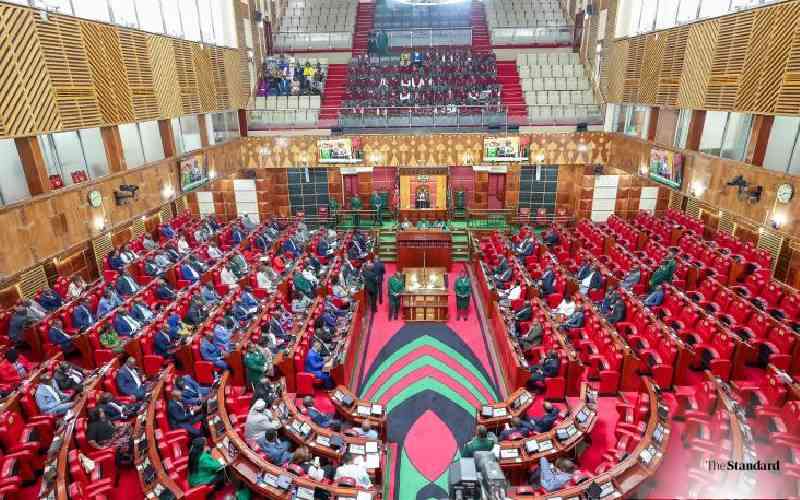Parliament's CDF coup: The Senate should halt this constitutional heist

When the National Assembly rose from its seats last week, a rare scene unfolded: both sides of the aisle applauded a unanimous vote. But celebration quickly curdled into alarm.
In a single afternoon, every MP endorsed a Constitutional Amendment Bill designed to resuscitate the National Government Constituencies Development Fund (NGCDF). The very scheme the Supreme Court declared unconstitutional on August 8, 2022. That vote did not merely defy a judicial pronouncement; it defied the foundational architecture of the 2010 Constitution.
The amendment now heads to the Senate. If the upper House values constitutional order, leadership integrity, and devolution, it must reject this proposal or, at the very least, insist that it be subjected to a referendum under Article 255.
At the core of the Supreme Court’s judgment lay an obvious but crucial point: legislators cannot simultaneously make law, implement projects, and then audit themselves. Doing so collapses the checks and balances that prevent any one arm of government from becoming judge, jury, and executioner.
The court held that CDF’s architecture breached the separation of powers by inserting MPs into executive turf. The unanimous vote to entrench NGCDF in the Constitution is nothing short of a legislative rebellion against that ruling.
The rebellion is also a direct affront to Article 73(2)(a)(ii), which demands objectivity and impartiality in decision-making, and Article 73(2)(e), which insists on accountability to the public. MPs legislating themselves a lucrative development purse cannot claim objectivity. Nor can they convincingly oversee the same projects they bankroll. Their action flouts the principle of selfless public service, erodes public trust, and exposes an institutional conflict of interest.
Article 116(3) of the Constitution states that a law “that confers a direct pecuniary interest on members of Parliament shall not come into force until after the next general election.” The intent is clear: Parliament may not enrich itself in the middle of a term. NGCDF allocations translate into political capital and, in practice, a powerful campaign war-chest. By rushing the amendment through Parliament with immediate effect, MPs are attempting to sidestep a guard-rail meant to prevent precisely this type of self-dealing.
Kenyans designed the 2010 Constitution to operate on a two-tier system: national and county governments. They embedded the objects of devolution in Article 174: promote equitable development, protect minorities, give power of self-governance to the people, and enhance checks and balances. By inserting a constituency-based fund into the Constitution, Parliament is smuggling in a third layer of devolved spending, without public debate, without a referendum, and without clarity on how funds will coexist with county budgets. The result is inevitable turf warfare, duplication, and a hollowing-out of county autonomy.
Article 255(1)(d) and (g) protect both devolution and Parliament’s own functions from casual tinkering. Any amendment that “relates to the objects, principles and structure of devolved government” or “the functions of Parliament” must go to a referendum. The National Assembly knows this. Its unanimous vote is therefore an astonishing display of constitutional brinkmanship, gambling that the Senate will play along or that the courts will hesitate to thwart the political class twice.
The Auditor-General’s reports teem with red flags over CDF projects: inflated contracts, ghost classrooms, unfinished health centres. Yet no MP has ever been sanctioned by Parliament for mismanaging CDF money. Embedding NGCDF in the Constitution would only enlarge the kitty while shrinking the possibility of accountability. When the Auditor-General discovers fraudulent expenditure, the report lands on the desks of the very legislators under scrutiny. Expecting impartial oversight in such circumstances is like asking a defendant to write the judge’s ruling.
The Senate was created to be the custodian of devolution and a constitutional counterweight when the National Assembly overreaches.
That mandate is now on trial. Article 96 gives the Senate power to protect county interests; Article 257 empowers it to demand that certain amendments face the people at the ballot. Senators must insist that introducing a third spending tier and turning legislators into project contractors, triggers Article 255 protections. Anything less would be an abdication of their raison d’être.
Stay informed. Subscribe to our newsletter
Moreover, leadership and integrity principles bind senators just as tightly as MPs. If the Senate rubber-stamps the amendment, it will join the National Assembly in subverting Article 73 and green-lighting a massive conflict of interest. The Senate must therefore do three things:
Constitutional vigilance cannot be outsourced. Civil-society groups, county assemblies, the Law Society, professional bodies, and ordinary citizens must study the Supreme Court’s 2022 judgment and keep pressure on the Senate. Should senators falter, litigation will be inevitable, but legal proceedings take time. A quicker remedy is civic mobilisation: petitions to county assemblies, peaceful demonstrations, opinion pieces, and social-media campaigns to expose the constitutional stakes.
Lobbyists will argue that NGCDF “brings development to the grassroots.” So does devolution. Only with transparency, public participation, and professional procurement.
If the real concern is equitable development, Parliament should increase county allocations, strengthen county procurement oversight, and punish governors who steal. Short-circuiting the Constitution is not development; it is daylight robbery in the name of the poor.
Kenya’s constitutional history is littered with moments when institutions were tested and found wanting. The Senate now faces such a moment. Upholding the Constitution is not an act of defiance; it is an oath-bound duty.
If senators capitulate to the political sugar rush emanating from the National Assembly, they will erode not just devolution but the entire principle of constitutional supremacy.
The choice is stark: either defend the separation of powers, respect Article 73’s integrity mandate, honour Article 116(3)’s safeguard against self-enrichment, and uphold Article 255’s referendum requirement, or concede that the political class can rewrite the rules whenever expedient. Kenyans did not endure decades of struggle, blood, and negotiation to watch their Constitution hollowed out by unanimous applause. The Senate must draw the line.







